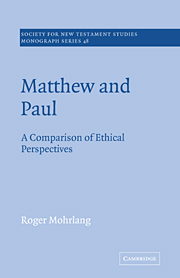2 - Reward and Punishment
Published online by Cambridge University Press: 17 August 2009
Summary
Having looked at the ethics of Matthew and Paul from the viewpoint of law, we now shift our attention to the different but related question of recompense. Of what significance are the concepts of reward and punishment, especially eschatological reward and punishment, in their overall moral perspectives? To what extent do the two writers seek to motivate ethical behaviour by either enticement or threat? The results of the analysis in this chapter should correlate, at least to some degree, with those of the preceding one, as the two issues are related.
Matthew
As we might expect of one whose outlook is so strongly shaped by legal perspectives, Matthew has more material relating to rewards and punishment than any of the other evangelists. The idea of recompense, especially eschatological recompense, pervades the Gospel and functions significantly in the evangelist's motivation of ethical behaviour.
Eschatological Recompense and Ethical Motivation
Matthew writes with an eye to the kingdom. For him, the hope of gaining entrance to the kingdom of heaven is of central importance, and bears directly upon the whole matter of ethics. This is what lies behind the demand for deeper righteousness in the Gospel (5.20; cf. 6.33). Thus, the initial summaries of the preaching of both John the Baptist and Jesus are programmatic for the teaching that follows in the Sermon on the Mount: ‘Repent, for the kingdom of heaven is at hand’ (ἤγγικɛν: 3.2; 4.17*; cf. 10.7).
- Type
- Chapter
- Information
- Matthew and PaulA Comparison of Ethical Perspectives, pp. 48 - 71Publisher: Cambridge University PressPrint publication year: 1984



